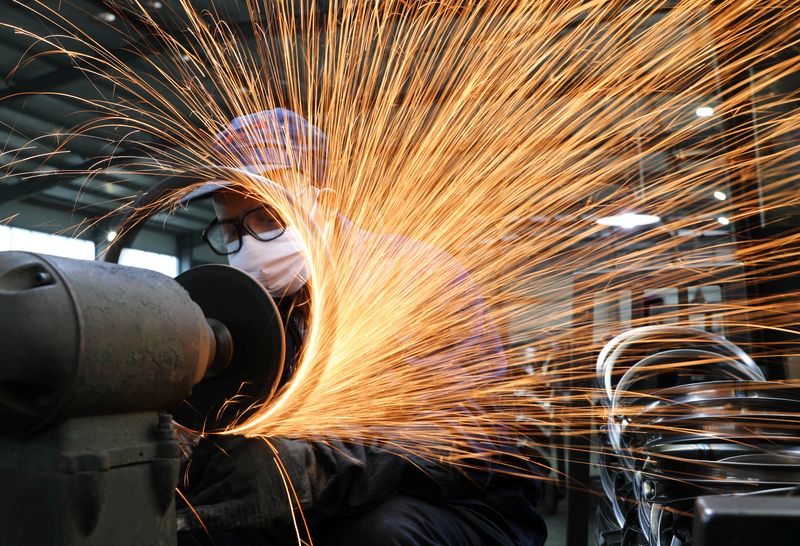[ad_1]
 © Reuters. FILE PHOTO: A employee sporting a face masks works on a manufacturing line manufacturing bicycle metal rim at a manufacturing facility, because the nation is hit by the novel coronavirus outbreak, in Hangzhou, Zhejiang province, China March 2, 2020. China Day by day through REUTERS/File Ph
© Reuters. FILE PHOTO: A employee sporting a face masks works on a manufacturing line manufacturing bicycle metal rim at a manufacturing facility, because the nation is hit by the novel coronavirus outbreak, in Hangzhou, Zhejiang province, China March 2, 2020. China Day by day through REUTERS/File Ph
BEIJING (Reuters) -China’s manufacturing exercise contracted for a fifth straight month in August, an official survey confirmed on Thursday, sustaining stress on officers to offer assist to shore up financial progress amid comfortable demand each at residence and overseas
The official buying managers’ index (PMI) rose to 49.7 from 49.3 in July, in keeping with the Nationwide Bureau of Statistics, staying under the 50-point stage demarcating contraction from enlargement. The studying was above a forecast of 49.4.
The world’s second-largest financial system dangers lacking Beijing’s annual progress goal of round 5% as officers wrestle with a worsening property stoop, weak shopper spending and tumbling credit score progress, main main banks to downgrade their progress forecasts for the yr.
“It is too early to inform, however immediately’s print suggests {that a} sequential uptick in progress exercise within the third quarter may nonetheless be attainable,” mentioned Louise Bathroom, senior economist with Oxford Economics.
“Notably if incoming stimulus begins feeding via to the financial system.”
Beijing on Sunday introduced halving the stamp obligation on inventory trades, the primary reduce to the tax since 2008, to spice up investor sentiment.
Detailed guidelines had been additionally unveiled on Friday to ease first-home mortgages. And a few Chinese language state-owned banks will quickly decrease rates of interest on present mortgages.
The contemporary strikes got here after a raft of measures aimed toward reviving big-ticket purchases, notably of new-energy automobiles. Nonetheless, many analysts see solely a slim probability for any drastic stimulus amid considerations over mounting debt dangers.
The non-manufacturing PMI, which contains sub-indexes for service sector exercise and building, fell to 51.0 from July’s 51.5, led by a unbroken fall in companies exercise.
“With mounting proof that non-manufacturing exercise is slowing, a extra decisive upturn in manufacturing can be wanted to maintain total progress from slowing,” mentioned Frederic Neumann, chief Asia economist and co-head of World Analysis Asia at HSBC.
The composite PMI, together with each manufacturing and non-manufacturing exercise, rose to 51.3 from 51.1.
[ad_2]
Source link



